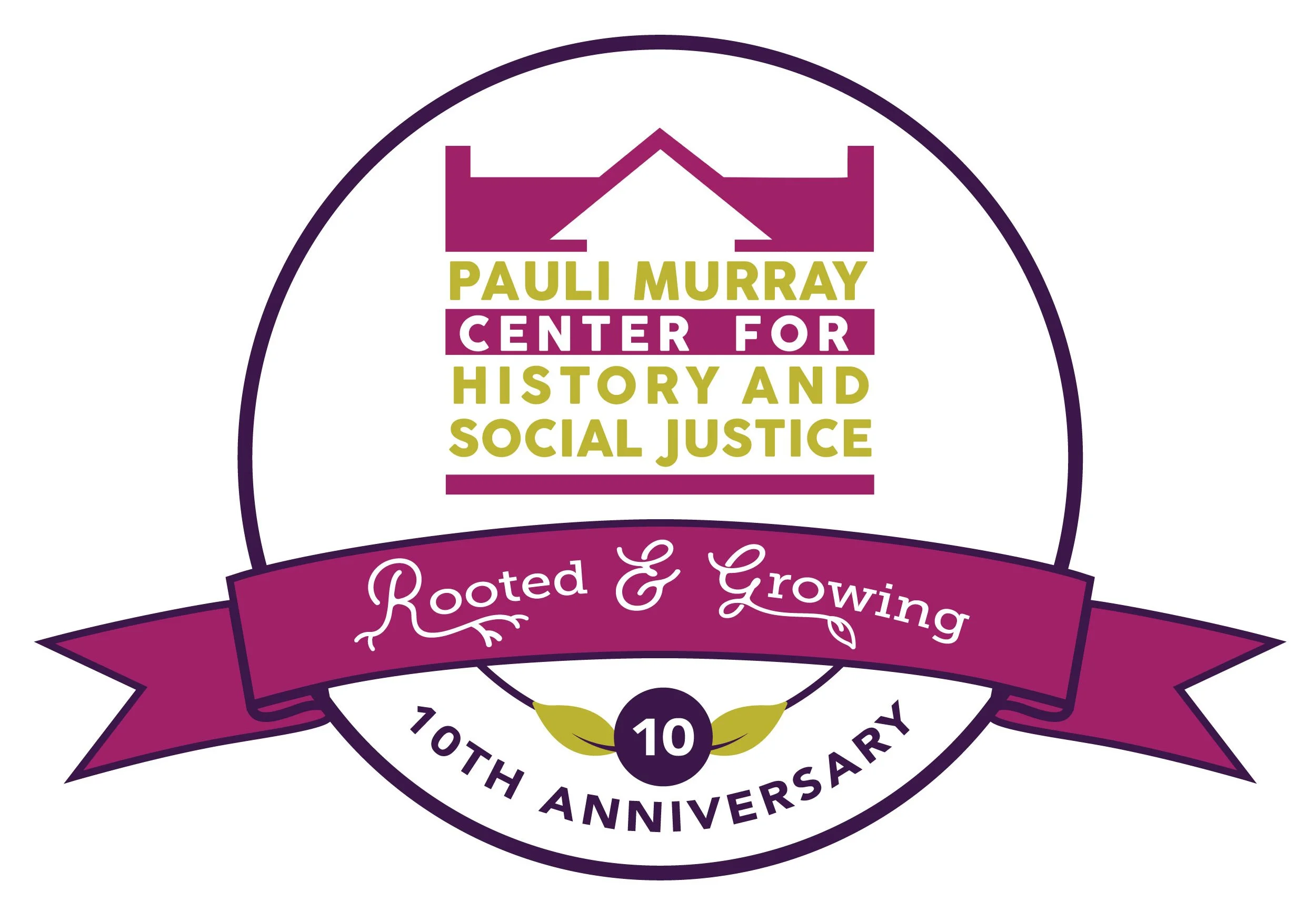Join the party and celebrate the Pauli Murray Center's ten-year anniversary!
10 years ago, we came together to prevent Pauli Murray’s childhood home from being demolished. What was once an aspirational start-up is now the Pauli Murray Center for History and Social Justice: a community gathering space (predominantly online for now); a place where history is valued; a table for dialogues promoting social justice activism; a learning space for reading and writing and creativity; and a family-friendly memorial.
Drop by the house anytime between 10 AM and 2 PM on Saturday, June 18th for:
10:00 AM - Welcome
10:30 AM - "Meeting" the Fitzgerald ancestors, presented by Whistle Stop Tours
11:00 AM - Watching actors from Hidden Voices share a scene from the original play about Pauli Murray, To Buy the Sun
12:00 PM - Mayor’s Proclamation
12:30 PM - Unveiling a new gift to the Center - one of Pauli Murray's personal typewriters
1:00 PM - Dancing and listening to new original music about Pauli Murray by Mobile Homecoming
All day - Creating chalk murals and other artistic activities
All day - Previewing our new Education & Welcome Center design
All day - Meeting the folks who led the archaeology excavation of the Center
All day - Purchasing books from The Regulator that are by and about the Rev. Dr. Pauli Murray
To honor our years of shared work, please consider making a gift of $10, $100, $1,000, $10,000 – all amounts are appreciated – so that together we can ensure the Pauli Murray Center continues to thrive for decades to come.
10 Goals for the Next Decade
Highlights from the Pauli Murray Center’s History
1898: Pauli Murray’s family home was built in Durham, North Carolina by her maternal grandparents Robert and Cornelia Fitzgerald.
1910: Pauli Murray is born in Baltimore, Maryland, the fourth of six children to nurse Agnes Fitzgerald and educator William Murray.
1914: After her mother dies, Pauli Murray moves to the Durham family home to live with her Aunt Pauline and grandparents. Her siblings remain in Baltimore.
2007-2009: 14 Murals, including five of Pauli Murray, are created through a collaborative community process led by artist Brett Cook. Sponsored by the Center for Documentary Studies and the SWCD Quality of Life Project.
March 2009: Pauli Murray Project (PMP) established at the Duke Human Rights Center/Franklin Humanities Institute by Robin Kirk and Barbara Lau with support.
July 2009: PMP creates new annual programs, including the Pauli Murray Service held at St. Titus Episcopal Church in Durham, co-sponsored by the Episcopal Diocese of NC.
June 2012: Pauli Murray Center for History and Social Justice (PMC) is established as a non-profit organization.
2014: The National Trust for Historic Preservation names the Family Home a National Treasure.
2016: The Pauli Murray Family Home is designated a National Historic Landmark by the National Park Service and the U.S. Department of the Interior.
1953: Aunt Pauline sells the Durham family home and moves with her sister to live in New York City with their niece, Pauli.
1956: Pauli Murray publishes Proud Shoes: The Story of an American Family, a chronicle of the Fitzgerald family and early Durham history.
1985: Pauli Murray dies. They are buried in Cypress Hills National Cemetery in Brooklyn, New York with their long-term partner, Irene Barlow, and aunts.
2010: PMP commissions playwright Lynden Harris to create a play about Pauli Murray entitled “To Buy the Sun,” with performances at Hayti Heritage Center, Carrboro Arts Center, NCCU, Duke and UNC-CH.
April 2011: The Durham family home was prevented from being demolished by a coalition including PMP, SW Central Durham Quality of Life Project (QOL), and Self-Help with support from Duke University.
November 2011: An NC State Highway Historic Marker is created in honor of Pauli Murray, installed on West Chapel Hill Street.
2017: PMC begins collaborations with Whistle Stop tours to offer regular walking tours of the West End neighborhood.
2018: PMC's exhibit Pauli Murray: Imp, Crusader, Dude, Priest is displayed at St. Paul’s Chapel in New York City.
2019: PMC installs exhibit on the lawn so that visitors can learn about the Rev. Dr. Pauli Murray’s legacy and the significance of the site.
2020: PMC shifts to online programming due to the COVID-19 pandemic. Establishes new signature programming, including a virtual book club.
Summer 2021: PMC embarks on a Greater West End Oral History Project, interviewing eleven elders from the Durham community.
September 2021: PMC receives a 3-year 1.6 million grant from the Andrew W. Mellon Foundation to expand staff capacity and to design and install inaugural exhibits.

























